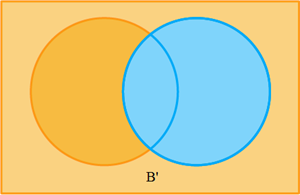
PUMPA - SMART LEARNING
எங்கள் ஆசிரியர்களுடன் 1-ஆன்-1 ஆலோசனை நேரத்தைப் பெறுங்கள். டாப்பர் ஆவதற்கு நாங்கள் பயிற்சி அளிப்போம்
Book Free DemoDifference of two sets:
The difference of sets A and B is the set of elements which belong to A but not to B. Symbolically, we write A – B and read as "A minus B".
Symbolically we write A-B=\{x:x\in A\ \mathrm{and}\ x\notin B\} and B-A=\{x:x\notin A\ \mathrm{and}\ x\in B\}
Let A=\{2,\ 4,\ 6,\ 8\}, B=\{6,\ 8,\ 10,\ 12\}. Find A-B and B-A.
In the Venn diagram below A and B are represented.
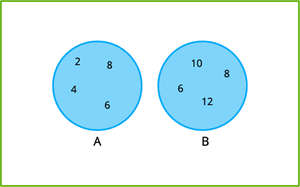
In the Venn diagram below, the area in the yellow colour represents A - B.
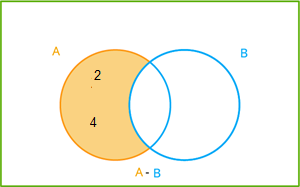
In the Venn diagram below, the area in the yellow colour represents B - A.
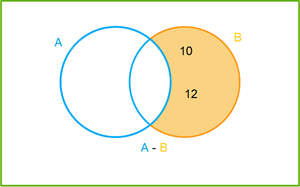
Symmetric Difference of Sets:
The symmetric difference of two sets A and B is the set of union elements which belong to A but not to B, and symbolically we write A – B and read as "A minus B". If it belong to B but not to A, symbolically we write B – A and read as "B minus A". Symbolically we write (A–B)∪(B–A). It is denoted by A Δ B.
Symbolically we write A\Delta B = \{x:x\in A-B\ \mathrm{or}\ x\in B-A\}.
In the Venn diagram below A and B are represented.

In the Venn diagram below, the area in the blue colour represents A Δ B.
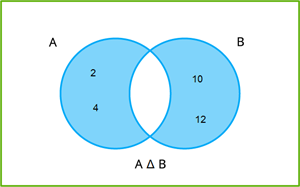
Complement of a set:
Let U be the universal set, and A be a subset of U. Then the complement of A is the set of all elements of U which are not the elements of A. Symbolically, we write A′ to denote the complement of A with respect to U.
Symbolically we write A^\prime = \{x: x\in U\ \mathrm{and}\ x\notin A\}. Obviously A^\prime=U-A.
Note: The complement of a set A can be looked upon, alternatively, as the difference between a universal set U and the set A.
In the Venn diagram below, the area in the blue colour represents A'.
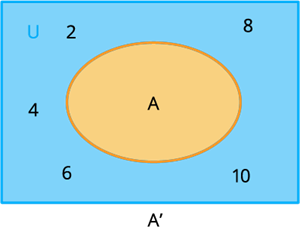
If A and B are two sets, then the complement of A and B are A' = U - A and B' = U - B
In the Venn diagram below, the area in the blue colour represents A'.
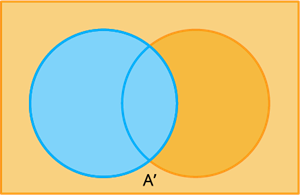
In the Venn diagram below, the area in the blue colour represents B'.
